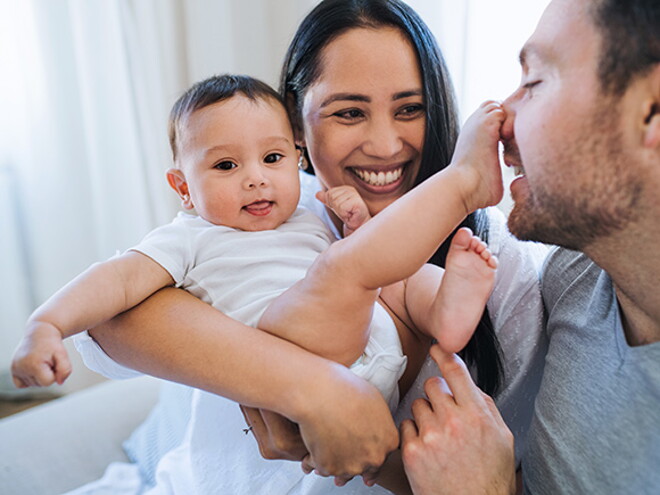
Is shared parenting the future?
Equal time with the kids. All housework split evenly. The mental load divided fairly. Shared parenting may sound like the dream but is it really achievable? Find out who’s practicing equal parenting responsibilities around the world and what might be holding others back—it may prompt you to assess your own collaborative parenting set-up.
What is shared parenting?
Shared parenting—or collaborative parenting—is the purposeful practice of two parents sharing equally in the responsibilities of raising their children, carrying out domestic tasks, bearing the mental load, earning money, and having time for themselves.
The practice of sharing parenting duties is becoming more common in many countries around the world as modern dads move away from traditional stereotypes to become more equal partners. This is demonstrated with 62% of parents surveyed globally believing that dads are more active and engaged in childcare than previous generations.
Of course, it’s not only moms and dads who are sharing the parenting responsibilities. Changing family structures may also be contributing to an increase in sharing parental responsibilities, with more children growing up in multi-generational family homes than before, as well as more same-sex parents raising children.
What are the benefits of equal parenting time?
If you are in a partnership, one of the biggest benefits of equal parenting time has to be that you both get the same amount of special bonding moments with your children, watching them grow and develop every day. You also get equal opportunity to pursue your careers, with no one partner feeling like they carry the burden of having to provide financially for the family. In Chile for example, where more than half (52%) of moms and dads report sharing more equal parenting responsibilities and domestic tasks, the number of working moms is on the increase.
Collaborative parenting can also be great for your relationship. Just imagine, no more arguments about whose turn it is to cook dinner or resenting your partner for never cleaning the bathroom, because everything is shared fairly. You may feel empowered by what you can achieve in your ‘dream team’ and less overwhelmed and lonely as a result. In fact, in Spain, where 64% of parents agree that childcare responsibilities are equally shared in their household, only 20% say they felt lonely in the first months after birth—this is one of the lowest figures globally.
Why aren’t equal parenting responsibilities practiced everywhere around the world?
With so many benefits of equal parenting time, why isn’t everyone sharing the load? This may come down to a combination of practical reasons as well as cultural norms. For example, in Mexico, where collaborative parenting isn’t common, dads are only entitled to five days of paternity leave, which may be limiting their ability to get more involved. This contrasts with Germany, where although dads have access to a broader parental leave allowance, only half choose to take it and this is typically only for two months, compared with moms who tend to take 12 months. This may indicate that, despite changes being made to support more active dads, caring for the family and home is still seen as mom’s work, which she then juggles on top of her day job.
In Romania, cultural traditions mean that dads are more likely to work and earn money for the family, whereas mom’s role is to stay at home and look after the children. This is reflected by respondents not seeing an improvement in how parenting is split compared with previous generations, and half even thinking their partner is less involved!
It may also come down to perception—new global analysis of 16 countries reveals that half (47%) of dads claim parenting is shared equally in their home, whereas only 30% of moms agree.
What’s next for collaborative parenting?
Despite more families sharing the parenting load, less than half (49%) of parents globally report that childcare responsibilities are equally split. There is also a consensus that moms bear the brunt of the parenting challenges—meaning there is still room for improvement.
Interestingly, even a complete shift to equally shared parenting has limited overall impact on how easy parents find their role, according to the Parenting Index. In other words, parenting is hard regardless! But this shouldn’t underestimate the importance of having an involved partner—or indeed active family and friends—so you can share the parenting highs and lows, alongside works commitments and opportunities like having some ‘me time’. Data shows parents who share responsibilities equally are happier, more confident, more fulfilled, and in better physical and mental shape.
Feeling like there are some imbalances in your parenting partnership? Get first-time dad tips and find out why maternal gatekeeping should be avoided.
Recommended checklists
Read about other struggles of parents worldwide

Planet Parent
Sources
The Parenting Index, First Edition 2021, theparentingindex.com
Last revised: May 2022





